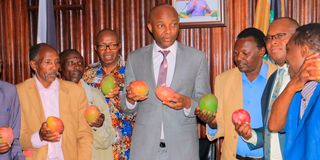Murang’a mango growers cry foul as brokers smile to bank

Governor Irungu Kang’ata with mango stakeholders in his office on February 7.
It is another mango season in Murang’a County. Despite lorry loads of mangoes leaving for other regions, value-addition has remained a mere dream.
Annual county reports in the last eight years tell a rosy story of the possibility of Murang’a making at least Sh5 billion from mangoes, with scientific breeding, value-addition and a structured market.
But that is not the case. The June 2022 report on trade in Murang’a says the mango industry made only Sh134 million.
The only time the region made more money was in 2018 when farmers earned Sh300 million.
The boom was attributed to farmers adopting exotic mango fruits.
Desperate for money, most mango farmers air their fruits on roads for sale, especially the Thika-Nyeri highway.
“We make Sh10 to Sh20 per fruit by selling exotic mangoes to motorists. We can make Sh30 per kilo of the local fruit. Unfortunately, no farmer can sell even 20 percent of his or her harvests that way,” said Milkah Njeri, a farmer in Maragua.

Mango vendors in Kitini, Murang’a South sub-county. They have been complaining of low prices.
Njeri added that she is capable of making Sh300,000 from her 15 mango trees “but the best I have ever got in the last decade was Sh25,000”.
Even with that, expenses alone totalled Sh15,000.
Poverty
“Our leaders need to know that returns from mangoes can educate our children and create more wealth. It is possible for mangoes to break the cycle of poverty associated with Murang’a County,” she says.
“I have heard of value-addition and keep wondering if this region has leaders.”
Small Scale Horticulture Traders Association chairman, James Mugendi, recently urged the devolved government to commit to value addition in the mango industry.
“It is time to put a stop to this annual ritual when the mango season sets in. We provide vitamins to the nation but remain poorer than before,” he said during a meeting of mango farmers in Kamuiru.
Mugendi lamented that Murang’a County and its mangoes have become a good source of social media banter and jokes.
“It is said that babies conceived between January and March end up having the mango as their favourite fruit,” Mugendi said.
He complained that the mango season in Murang’a is only beneficial to brokers and buyers from Nairobi and other counties “as our farmers get just enough as a thank you for producing mangoes”.
“We demand a devolved government action plan that will organise us into producer groups through the cooperative department, empower us with technology and enact laws to structure the market,” he said.
“We need value addition that will see us make juice and wine from mangoes. That will mean more money to farmers.”
Mango value-addition
In 2018, then-governor Mwangi wa Iria said he was pursuing a mango value-addition partnership with Egyptian investors.
Iria added that he was working on a way to eliminate market imperfections and dealing with post-harvest losses.
“The mangoes we lose due to lack of market, perishability and exploitative grading are more than what we sell. We must monetise every mango harvested in Murang’a for the benefit of farmers,” he said.
By the time he left office last year, farmers were still waiting for Iria to keep his promises.
He blamed the national government for being “lazy, unwilling and reluctant to fund counties in full and in good time”, saying that had crushed many development visions.
Governor Irungu Kang’ata has held talks with private fruit processors on value addition.
But farmers like Hannah Wanjoki are not convinced anything is happening.
“The governor posts on social media that he is consulting and having talks about our mangoes. Now we are in another loss-making season,” says Njoki who sells her mangoes to city traders.





